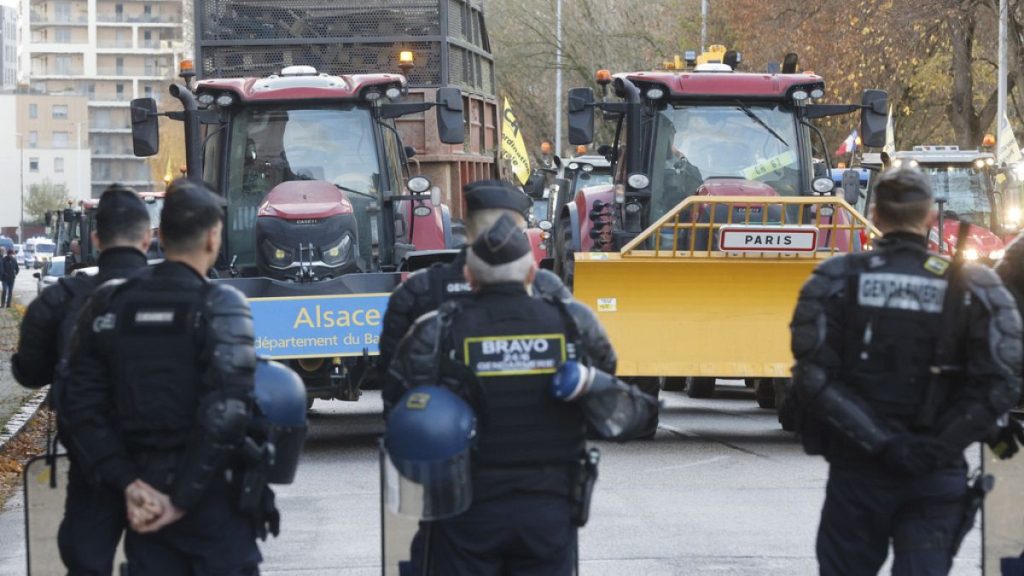Summarize this content to 2000 words in 6 paragraphs
France has fervently opposed the free trade agreement between the EU and five South American nations.
After decades of negotiations, the Mercosur treaty continues to stir up controversy. Hundreds of farmers have been protesting for the past weeks in France and other European countries against the free trade agreement between the EU and the South American bloc comprising of Brazil, Argentina, Paraguay, Uruguay, and Bolivia (also known as Mercosur). Euronews looked into why the Mercosur treaty is so controversial and whether opposing countries, such as France, can block the deal. What is the Mercosur treaty?It is a free trade agreement that aims to eliminate almost all taxes on products traded between the two signatory blocs. The deal seeks to establish one of the world’s biggest free trade zones, encompassing 750 million people and about one-fifth of the global economy. By signing this agreement, Europe would be able to export cars, machinery, pesticides, pharmaceuticals, wine and cheese much more easily. On the other hand, Europe would be able to import car parts and food products at a much cheaper rate from the South American countries. Why are farmers protesting against it?Many farmers believe the treaty could devastate Europe’s agricultural sector and bring about unfair competition. “We have regulations to produce food in quantity and quality. Today, other countries, notably those in South America, don’t have the same regulations. That’s what we’re denouncing,” said Stéphane Joandel, a French dairy farmer and general secretary of a farmers’ union.”We can’t ask farmers to produce while respecting all the norms and then import products that don’t respect animal welfare, environmental rules or even labour laws,” he told Euronews. European farmers are demanding “mirror clauses” which would require their competitors to follow the same rules and regulations. Although the EU Commission assures the Mercosur countries will have to comply with rules and regulations, a recent report claimed that Brazil does not have sufficient guarantees to ensure that meat with hormones banned in the EU will not reach the continent. Who are the winners and losers of the deal?According to Charlotte Emlinger, an economist specialising in trade and agriculture, the winners are the manufacturing industry in sectors such as automobiles, pharmaceuticals, machinery, textiles and others, as well as French wine and cheese makers. The losers are the beef and poultry industry, explained Emlinger. However, she believes Mercosur’s impact will be very limited. “What has been negotiated is a reduction in customs duties on a certain volume of products, such as a relatively small volume of beef. We’re talking about 99,000 tonnes of beef. That’s only 1.2% of European beef consumption. These volumes will have a limited impact on the European market,” she told Euronews. “The farmers’ anger is understandable, even legitimate. This is an economically very fragile sector, which has recently had to cope with diseases and bad weather. I think Mercosur is the straw that broke the camel’s back rather than the core of the problem,” she argued. Which countries are in favour of the Mercosur trade agreement?Several major EU economies are in favour of the treaty, such as Germany, Portugal and Spain. “Is the European Union interested in isolating itself? Or is it interested, in this particular geopolitical context that we are experiencing, and especially after the US election, in expanding the network of trade agreements with third countries to maintain our economic and commercial influence as well? I think the answer is very clear,” said Luis Planas Puchades, Spain’s Agriculture Minister. Ursula von der Leyen, President of the European Commission, has also expressed strong support, calling it “an agreement of great economic and strategic importance.” Which countries oppose the trade deal, and can they block it?France has fervently opposed the Mercosur treaty, along with Poland, Austria and the Netherlands.Last Wednesday, France’s lower house of parliament voted almost unanimously against the deal – a rare show of unity in a politically divided country. But the vote was merely a symbolic one.If it were to block the trade agreement, France would need to rally a minimum of three EU countries that represent at least 35% of the bloc’s population. At the moment, the only populous country that has joined France’s side is Poland. Paris still needs to find two more large countries to form a blocking minority.France has courted nations with large populations, such as Italy and Romania, in order to reach the threshold needed to stop the deal. What’s next?The Mercosur summit, which will be held on 5 and 6 December in Uruguay, could be a key moment for the signing of the agreement.If the EU and the South American bloc manage to finalise the treaty then, it will still take several months, if not years, for its new rules to come into force.
Keep Reading
Subscribe to Updates
Get the latest creative news from FooBar about art, design and business.
© 2026 Globe Timeline. All Rights Reserved.













